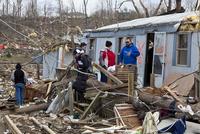-
FDA shuts down more than 1,500 online pharmacies

The U.S. Food and Drug Administration (FDA) and Interpol have shutdown 1,677 online pharmacies for selling counterfeit or substandard medication and selling drugs without the necessary safeguards.
-
-
Our farblondzhet senators

The Senate immigration reform bill has been presented as an effort to resolve the many complex problems resulting from the Immigration and Reform Act (IRCA) of 1986. Whether the bill passed by the Senate yesterday will succeed remains to be seen, but what is not in doubt is the fact that the border security provisions in the bill, in the words of Sen. Patrick Leahy (D-Vermont), read “like a Christmas wish list for Halliburton” and other big defense contractors. This is unfortunate, because the U.S.-Mexico border has become a graveyard for a long list of ambitious, technology-heavy – but ultimately ineffective and exceedingly wasteful – programs.
-
-
Renewables to surpass gas by 2016 in the global power mix: IEA

An International Energy Agency (IEA) report says power generation from hydro, wind, solar, and other renewable sources worldwide will exceed that from gas and be twice that from nuclear by 2016.
-
-
Transporting diluted bitumen through pipelines does not increase likelihood of release
Scientific study has found that the thick Canadian crude oil, known asdiluted bitumen, whichwould be shipped to the U.S. through the Keystone XL pipleline is no more dangerous than transporting other types of crude oil.
-
-
Environmentalists begin a summer of protest against Keystone project
A coalition of environmentalist groups calling itself “fearless summer” launched what it said would be a series of protests against the Keystone XLL pipeline project. Near the city of Seminole, Oklahoma, members of the group shackled themselves to industrial equipment and disruoted work at Keystone-related construction site. Ten were arrested.
-
-
Steering clear of tipping points – and economic collapses
A new study shows how specific parameters can help us steer clear of tipping points in dynamic systems, such as entire economies. By managing macro-economic parameters, scientists believe it is possible to steer an economy around irreversible changes in its complex dynamics and avert potential economic disasters.
-
-
States eager to attract cybersecurity companies
As the threat of cyberattacks grows, Maryland, Washington D.C., and Virginia want to cash in on the growing business of cybersecurity. Analysts say that several states are using tax breaks to get in on the $207 billion cybersecurity industry, which is expected to show “impressive growth” in the next five years.
-
-
New guide highlights three cyber security game changers
Cybercrime is on the rise, and it will grow even faster if organizations ignore an emerging group of cybersecurity game changers: always-on connectivity, an increasingly IT-centric society, and a new class system that separates people by technology skills.
-
-
Smart technologies tackle global food shortage
From monitoring soil moisture to measuring oyster heartbeats, Aussie farmers can help to tackle the global food shortage and significantly increase their productivity by taking advantage of new smart farming technologies enabled by next generation broadband networks.
-
-
$110 billion in damages makes 2012 second only to 2005 in terms of weather-related disasters

The U.S. National Climatic Data Center’s (NCDC) says that 2012 saw eleven weather and climate disaster events each with losses exceeding $1 billion in damages. This makes 2012 the second costliest year since 1980, with a total of more than $110 billion in damages throughout the year. The 2012 total damages rank only behind 2005, which incurred $160 billion in damages due in part to four devastating land-falling hurricanes.
-
-
Factors influencing spinach E. coli contamination before harvest
Researchers have identified a variety of factors that influence the likelihood of E. coli contamination of spinach on farms prior to harvest. They found that E. coli contamination of spinach on farms in Colorado and Texas was 172 times more likely if the produce field was within ten miles of a poultry farm, and sixty-four times more likely if irrigated by pond water.
-
-
Senate immigration bill would reduce deficits by $200 billion over decade: CBO
A long-awaited report by the nonpartisan Congressional Budget Office offered a major victory for the bipartisan Gang of Eight senators and the draft immigration overhaul they drafted: the detailed report finds that the immigration bill now being debated in the Senate would reduce federal deficits by nearly $200 billion over the next decade even with higher spending on border security and government benefits. The report estimates that over the following decade — from 2024 to 2033 — the deficit reduction would be even greater, reaching an estimated $700 billion.
-
-
Shale oil and shale gas resources globally abundant: report
Estimated shale oil and shale gas resources in the United States and in 137 shale formations in forty-one other countries represent 10 percent of the world’s crude oil and 32 percent of the world’s natural gas technically recoverable resources, or those that can be produced using current technology. A new report estimates technically recoverable 345 billion barrels of world shale oil and 7,299 trillion cubic feet of world shale gas.
-
-
Immigration bill includes benefits to some industries
The immigration reform bill currently being debated on Capitol Hill, in addition to giving immigrants a pathway to citizenship, strengthening border security, and requiring better enforcement of laws which aim to prevent the hiring of undocumented workers, also includes benefits for specific industries and groups.
-
-
Newark to raise water rates to pay for infrastructure

A report presented to Newark’s city council said that the town’s water and sewer rates will be increased by more than 60 percent over the next ten years in order to pay for $500 million in infrastructure repairs to the town’s faulty and outdated meters, century-old, leaky pipes, and broken valves.
-
More headlines
The long view
Ransomware Attacks: Death Threats, Endangered Patients and Millions of Dollars in Damages
A ransomware attack on Change Healthcare, a company that processes 15 billion health care transactions annually and deals with 1 in 3 patient records in the United States, is continuing to cause massive disruptions nearly three weeks later. The incident, which started on February 21, has been called the “most significant cyberattack on the U.S. health care system” by the American Hospital Association. It is just the latest example of an increasing trend.
Chinese Government Hackers Targeted Critics of China, U.S. Businesses and Politicians
An indictment was unsealed Monday charging seven nationals of the People’s Republic of China (PRC) with conspiracy to commit computer intrusions and conspiracy to commit wire fraud for their involvement in a PRC-based hacking group that spent approximately 14 years targeting U.S. and foreign critics, businesses, and political officials in furtherance of the PRC’s economic espionage and foreign intelligence objectives.
European Arms Imports Nearly Double, U.S. and French Exports Rise, and Russian Exports Fall Sharply
States in Europe almost doubled their imports of major arms (+94 per cent) between 2014–18 and 2019–23. The United States increased its arms exports by 17 per cent between 2014–18 and 2019–23, while Russia’s arms exports halved. Russia was for the first time the third largest arms exporter, falling just behind France.
LNG Exports Have Had No Impact on Domestic Energy Costs: Analysis
U.S. liquified natural gas (LNG) exports have not had any sustained and significant direct impact on U.S. natural gas prices and have, in fact, spurred production and productivity gains, which contribute to downward pressure on domestic prices.
